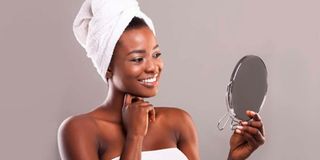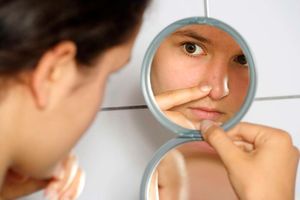Acne: Causes, prevention, and home remedies

Anyone, regardless of their skin type, can get acne but oily skin is the most acne-prone.
What you need to know:
- Acne can be caused by hormones, stress, genetics, diet, and medications
- Combining over-the-counter anti-acne treatments, a good skincare routine, and natural products can help clear acne.
Whatever prevention plan you choose, patience and consistency are essential. If you do not get better, you can consult your doctor to prescribe more effective treatment options.
Acne is a skin condition caused by excess production of sebum or by clogged pores. Depending on its severity, acne can cause emotional distress and take a toll on self-confidence.
Acne can strike at any age and can occur anywhere on the body including the face, back, neck, chest area, and shoulders.
Causes of Acne
Hormonal Changes
Teenagers are particularly susceptible to acne due to hormonal changes and increased sebum production during puberty. The increase in androgen hormones may lead to breakouts.
Hormonal changes in women can also lead to breakouts.
Diet
Foods like ice cream, doughnuts, and pastries that are high in fat and sugar can lead to breakouts. Ingredients used in these foods such as dyes or sweeteners make them more likely sources of inflammation when consumed frequently over prolonged periods.
Some medications
Acne side effects are usually common in corticosteroid, testosterone, or lithium drugs because they have substantial impacts on cells in your body compared to other medicines. It is best to continue with your prescription but if the outbreak is causing significant discomfort, speak to your doctor about other treatment options.
Stress
Anxiety and stress can increase the production of cortisol. Cortisol increases the production of oil in your skin, leading to acne breakouts.
Family history
Genetics plays a role in acne. If both your parents or a close relative had acne, you are likely to develop it too.
Beauty products
Acne-prone skin is more prone to breakouts when using harmful products. Be careful about what you put on your face since the wrong ingredients can cause an acne outbreak. Do thorough research before using any product.
Undiagnosed illnesses
In some cases, acne in adults may be due to an underlying sickness. Treating the disease can treat acne. For example, women who have polycystic ovary syndrome often develop adult acne because of unstable hormone levels
Skin routine for acne prevention and treatment
Wash skin twice a day and after sweating to help prevent acne
It is important to remove excess oil, dirt, and sweat. However, washing your face more than twice a day may make your acne worse. Clean the skin in the morning, before bed, and after strenuous exercise.
Be gentle with your skin
Do not use products that irritate your skin. Go for mild products that do not contain alcohol. Do not scrub your skin using a washcloth, mesh sponge, or anything else that can irritate the skin. This may worsen the condition, cause more swelling, blocking, and redness.
Avoid touching your face
Touching your skin can cause flare-ups because your hands come into contact with germs and bacteria often. Every time you feel your face, some dirt can be transferred to your skin and further clog your skin. Wash your hands regularly, and try avoid touching your face.
Avoid excessive sun exposure
The sun can affect the skin’s health and appearance. Constant sunburn weakens the skin, which in turn causes it to produce more oil and clog pores. It is important to wear sunscreen to help protect your skin and pay attention to the instructions on any products you use.
Avoid using heavy makeup
Makeup is a no-go-zone when dealing with a breakout. You might be tempted to cover it up with foundation or concealer, but this will make your acne worse. It can also clog your pores and trigger more breakouts. Always remember to remove make-up before going to bed.
Use over-the-counter acne treatments
Antibiotics may help reduce inflammation and bacteria on the skin. They can be applied to your skin or taken orally. Those taken by mouth are usually the last resort for severe acne or when acne does not respond to other treatments.
Know your skin type
Anyone can get acne, regardless of their skin type, but oily skin is the most acne-prone. Such skin glands produce excess oily sebum. Knowing your skin type will help you choose suitable skincare products.
Home remedies for acne
- Diet: Foods that offer a good supply of vitamin A, vitamin E, and zinc may reduce the risk of complications and severe acne. A diet that has low glycemic load can help too.
- Tea-tree oil: Can help cure mild to moderate acne.
- Tea: Polyphenols from tea, such as green tea, may help reduce sebum production and treat acne.
- Moisturisers: Aloe vera moisturizers can soothe and possibly have an anti-inflammatory effect.




